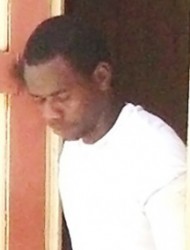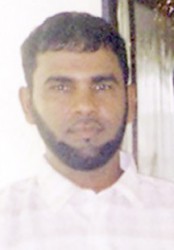Accused Rondell Bacchus, who yesterday denied murdering scrap iron dealer Akbar Ali during a robbery in 2008, will likely learn his fate today when his retrial is expected to conclude.
In 2013, Bacchus and former co-accused Andrew Morris were brought before the court to answer to the charge that on July 24, 2008, at Brickdam, they robbed Bibi Rameena Hydar Ali of $2.1 million and fatally shot her husband, Akbar Ali, in the process.
However, the charges against Morris were subsequently withdrawn by the Director of Public Prosecutions due to the lack of evidence, while Bacchus’s first High Court trial ended in a hung jury.
Having heard the evidence of the prosecution’s witnesses during the retrial, Justice Priya Sewnarine-Beharry yesterday called on Bacchus to lead his defence.
Opting to give unsworn testimony from the prisoners’ dock, Bacchus proclaimed his innocence in the matter, while claiming that he was randomly attacked and shot at by a group of men who were later identified as ‘special mission’ police officers before being arrested and charged for Ali’s murder two weeks later.
“I am innocent of this crime…at none time was I walking down Brickdam and at no time did I shoot Akbar Ali or rob his wife,” he said.

He also told the court that on the day he was allegedly attacked by the policemen, he was walking along Church Street when he heard gunshots being fired behind him. “When I look around, a policeman was firing shots at me… he never said anything, all he was doing was shooting and like what anybody else would do, I run for my life,” Bacchus related.
Bacchus showed the court an area on his arm where he claims to have suffered gunshot wounds as a result of that shooting.
A few weeks later, the accused stated that he was arrested at his home, taken to the hospital and then placed in the lock-ups.
Not long after, Bacchus explained that he was transported to the Police Headquarters at Eve Leary and placed on an ID parade where he was subsequently identified by Ali’s widow as the man who robbed her and killed Ali.
Framed

Addressing the jury during his closing arguments, defence lawyer Nigel Hughes presented the theory that his client was being framed by members of the Guyana Police Force after it was discovered that the gun used in the murder was a police-issued firearm.
He went on to share his skepticism with the jurors regarding the incident where his client was suddenly attacked and shot at while walking down Church Street.
The lawyer questioned how is it that only one of the 14 officers who were a part of the operation that day was able to give an account of what had transpired, while the others claim that they were not in position to give statements. It was Hughes’ contention that it was when the murder weapon was discovered to be police-issued that a plan was cooked up to frame an unsuspecting Bacchus.
He went on to explain that it was then that the gun’s registration number was filed off and a story was fabricated to implicate Bacchus as being in possession of the gun. It was further noted that no fingerprints were uplifted from the gun since it was never submitted for fingerprint testing.
Additionally, Hughes stated that the prosecution’s case was heavily dependent on the identification of his client by Hydar-Ali after being placed on a poorly executed police ID parade.
He noted that apart from such cases being notoriously unreliable, the description given by Hydar-Ali of her attackers was not enough to positively identify his client since she told the court that she only saw the man from the side during the attack.
Hughes also questioned how anyone could be arrested using the description since the only information supplied to the police was that the individual was a tall male of African descent with a voice that the victim claimed that she could recognise if she ever heard it again.
Opposing Hughes’ argument, state prosecutor Tuanna Hardy urged the jury to remember the physical evidence as well as the evidence given by the witnesses who testified during the trial, since it all points to Bacchus being the man who fatally shot Ali.
She asked the jury to believe that Hydar-Ali had positively identified Bacchus as the man who robbed her and killed her husband. Hardy also reminded them that the woman, in her evidence-in-chief, said that she can still see the face of her husband’s killer every time she closes her eyes.
The evidence presented throughout the case is expected to be summed up today by Justice Sewnarine-Beharry, after which the jury will be sent to deliberate on a verdict.
The case is presented by state prosecutor Narissa Leander in association with Hardy.




